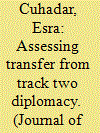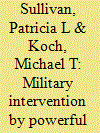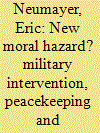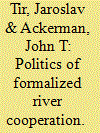|
|
|
Sort Order |
|
|
|
Items / Page
|
|
|
|
|
|
|
| Srl | Item |
| 1 |
ID:
090915


|
|
|
|
|
| Publication |
2009.
|
| Summary/Abstract |
This article focuses on the evaluation of transfer from Track Two diplomacy to negotiations and policymaking by examining four Track Two initiatives between Israelis and Palestinians over the issues of water and Jerusalem. The article first discusses the transfer process for the water and Jerusalem cases and then presents lessons drawn from the comparative study. The comparative assessment reveals similarities concerning transfer in terms of what the contributions of Track Two are to the process of negotiations, which transfer strategies are used, and what conditions are necessary to make a contribution to the outcome. Initiatives in both cases employ primarily the strategy of working with influential people and they are more successful in impacting the process of negotiations rather than the outcome. Their contribution to the process of negotiations shows regularities in the types of learning acquired and used. Successful transfer to outcome is observed in one occasion when transfer strategies were implemented effectively, the negotiators were open to outside information, and there was political willingness. Asymmetrical transfer of people, and of ideas, from Track Two initiatives to negotiations was a barrier to effective transfer.
|
|
|
|
|
|
|
|
|
|
|
|
|
|
|
|
| 2 |
ID:
090920


|
|
|
|
|
| Publication |
2009.
|
| Summary/Abstract |
The Military Intervention by Powerful States (MIPS) project develops a rigorous, generalizable measure of the effectiveness of military force as a policy instrument and applies the measure to code the outcomes of all military interventions conducted by five major powers since the termination of World War II. The MIPS dataset provides detailed data on US, British, Chinese, French, and Russian uses of military force against both state and non-state targets between 1946 and 2003. In particular, this project focuses on the political objectives strong states pursue through the use of force, the human and material cost of their military operations, and measures of intervention outcomes relative to the intervening states' objectives. The dataset also includes extensive data on factors commonly hypothesized to be associated with war outcomes, such as the nature of the target, the type of force used by the intervening state, and military aid and assistance provided to each side.
|
|
|
|
|
|
|
|
|
|
|
|
|
|
|
|
| 3 |
ID:
090918


|
|
|
|
|
| Publication |
2009.
|
| Summary/Abstract |
The relationship between military spending and economic inequality is not well documented within the empirical literature, while numerous studies have uncovered the linkages between military spending and other macroeconomic variables, such as economic growth, unemployment, purchasing power parity, black market premium, poverty and investment. The purpose of this article is to examine the causal relationship between military spending and inequality using BVC and SIPRI data across 58 countries from 1987 to 1999. Panel unit root tests indicate that two inequality measures (Theil and EHII) under consideration are likely to be non-stationary. The authors' work addresses the adverse implications of modeling with non-stationary variables, since this omission casts serious doubt on the reliability of the relationship between military spending and inequality. The recently developed panel Granger non-causality tests provide no evidence to support the causal relationship in either direction between the military spending and the change in economic inequality. The results are consistently robust to alternative data sources for military spending, to alternative definitions of the inequality measures, to the log transformation of the military spending, to the deletion of some data points, and to the division of OECD and non-OECD countries. Finally, the impulse responses and variance decompositions based on the panel vector autoregressive regression model are consistent with the findings from Granger non-causality tests.
|
|
|
|
|
|
|
|
|
|
|
|
|
|
|
|
| 4 |
ID:
090917


|
|
|
|
|
| Publication |
2009.
|
| Summary/Abstract |
The newly established International Criminal Court (ICC) promises justice to the victims of genocide, war crimes and crimes against humanity. Past offenders can be punished, while future potential offenders may be deterred by the prospect of punishment. Yet, justice is no substitute for intervention for the benefit of people at acute risk of being victimized. The Court may create a new moral hazard problem if the promise of ex post justice makes it easier for states to shy away from incurring the costs of intervention. This article indirectly tests for the relevance of this potential problem by estimating the determinants of ratification delay to the Rome Statute of the ICC. If the Court represents an excuse for inaction, then countries that are unwilling or unable to intervene in foreign conflicts should be among its prime supporters. Results show instead that countries that in the past have been more willing to intervene in foreign civil wars and more willing to contribute troops to multinational peacekeeping missions are more likely to have ratified the Statute (early on). This suggests that the Court is a complement to, not a substitute for intervention.
|
|
|
|
|
|
|
|
|
|
|
|
|
|
|
|
| 5 |
ID:
090914


|
|
|
|
|
| Publication |
2009.
|
| Summary/Abstract |
While much of the extant literature has focused on the potential of international rivers to generate militarized conflict, this study builds on more recent works that examine the politics of river cooperation. The article focuses on the efforts to regulate the use of international rivers formally by the means of treaties. The theoretical framework incorporates prominent variables from the (neo)realist and neo-liberal schools of thought as well as the need for potable water and river-related geographic factors. The framework is used to generate expectations about whether riparian countries will enter into the treaties dealing in particular with the issues of water quantity and quality. Systematic empirical evaluations covering the entire world in the 1948-2000 time period confirm some while challenging much of the conventional wisdom on the topic. Specifically, preponderant power distribution, economic interdependence, democratic governance, and water scarcity all increase the chances for formalized river cooperation between contiguous riparian states. In contrast, the findings suggest that the roles of allegedly important and problematic factors such as the upstream/downstream relationship and recent militarized conflict have been exaggerated in earlier research. Cumulatively, the findings sound a cautiously optimistic note for the prospects of the spread of formal river cooperation in the less developed parts of the world.
|
|
|
|
|
|
|
|
|
|
|
|
|
|
|
|
| 6 |
ID:
090919


|
|
|
|
|
| Publication |
2009.
|
| Summary/Abstract |
This article presents a cross-country comparison of the intensity of revolutionary terrorism in the developed world after the wave of mobilization in the late 1960s and early 1970s. Some countries were hit much more severely than others by this type of violence. The article tries to account for this variation with a new dataset of fatalities in 23 countries, for the period 1970-2000, based on local sources in six different languages. This dataset corrects in part the problems of underreporting that Jan Oskar Engene's TWEED dataset suffers from. The dependent variable is a novel index of the intensity of terrorism that combines the number of fatalities and the number of years in which the terrorist organization has killed people. The unit of analysis is the country in the whole period. Six broad hypotheses about the influence of economic development, social change, mobilization, welfare provision, population and political factors are tested in the article. The statistical results show that three variables are almost sufficient to explain variance: past dictatorship, high population and strong communist parties. Given that past dictatorship is the most important variable, three different mechanisms by which to understand its effect are suggested: the role of repression in countries with past political instability; dictatorship as a proxy for polarization; and past breakdowns as an indicator of the chances of overthrowing the system.
|
|
|
|
|
|
|
|
|
|
|
|
|
|
|
|
|
|
|
|
|